1:30min
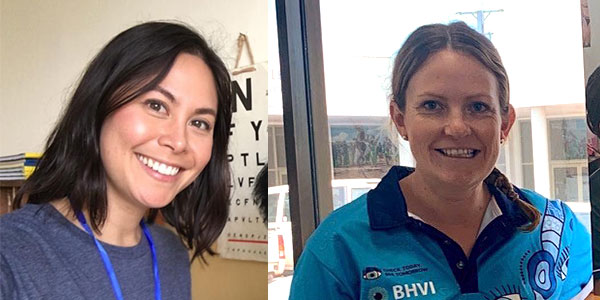
Optometrists Stephanie Bahler, left, and Sarah Nicholls, right
By Helen Carter
Journalist
Optometrists Stephanie Bahler from Perth and Sarah Nicholls from Darwin are perfect examples of practitioners making a huge difference working in public health optometry.
Sarah has locumed all around Australia, including in many remote Aboriginal communities, while touring the nation in a 4WD and camper trailer with her husband Paul and their dog Cooper. She now works full time in public health as Project Manager, Northern Territory for the Brien Holden Foundation’s Australia Program.
‘Without optometrists visiting these remote locations, Aboriginal and Torres Strait Islander people would have no access to spectacles or eye health care. It’s alarming to see the high rates of blindness and low vision in remote communities – currently three times higher than other Australians. Most of these people just need a pair of glasses,’ she said.
‘It’s also very rewarding to be involved in collaborative care of a person’s general health. We are responsible for diabetic retinopathy assessments and care. Ophthalmology visits are rare to the community, and the cost to transport patients to major centres for management is huge so visiting the community as an optometrist is very rewarding and we are well respected.
‘I locumed all around Australia on our travels, mostly in rural areas of New South Wales, coastal Queensland and remote Northern Territory. Locuming really teaches you to be flexible and adaptable in all settings. I found short term locum contracts up to three weeks were perfect for me. I then joined BHF in March 2019 as optometrist/project officer under the guidance of the amazing Anna Morse.’
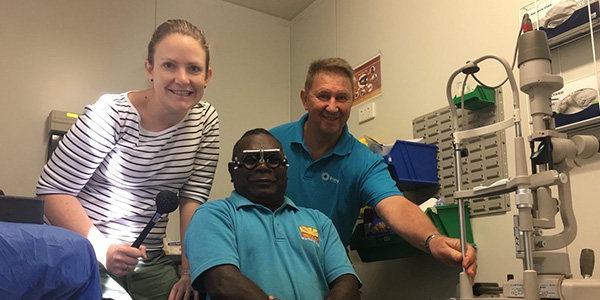
Sarah at Sunrise Health Service clinic, Minyerri, about 240km from Katherine, with Brien Holden Foundation assistant John Walsh, standing, and local worker Samuel
Stephanie has worked for a variety of employers, organisations and charities doing regional and remote work in the NT, Queensland and WA, working with Indigenous communities, and with eye charity OneSight has done school vision screenings in Australia, eye exams in China and established a clinic in Rwanda.
She has volunteered at homeless clinics, worked in corporate optometry and is now Senior Customer Development Manager for Johnson & Johnson Vision WA, although currently on maternity leave and locuming to maintain registration. Remote community testing in the NT has been a passion on and off for the past 10 years.
‘To maintain my registration, I tested eyes with Lions Outback Vision in the East Kimberleys and was living my best life – flexible working hours and connecting with optometrists in my full-time role plus remote community work,’ Stephanie said. ‘Remote Aboriginal work and the homeless shelter clinics are refreshing and remind me of why I became an optometrist in the first place.
‘I fell in love with ‘bush optometry,’ in particular flying into a dusty red community on a small twin-engine plane with just the pilot and one other person, or sometimes a small team of other allied health workers, and your portable luggage. You feel like you’re needed and that you’re going to make a real difference.
‘During the wet season you can marvel the wetlands from the sky and it is truly breathtaking. My most rewarding location has been Halls Creek with Lions Outback Vision as I was the sole optometrist that visited for two years. This allowed me to be known as ‘the optometrist’ in the town, and I built up trust within the community, regular patients and friendships.
‘I loved the four-hour drive from Kununurra to Halls Creek as it was ‘me time’ and it felt so ‘Australian’ as you’d see the rugged boulders, boabs, kangaroos, horses, cattle, 4WDs and road trains. It was therapeutic.’
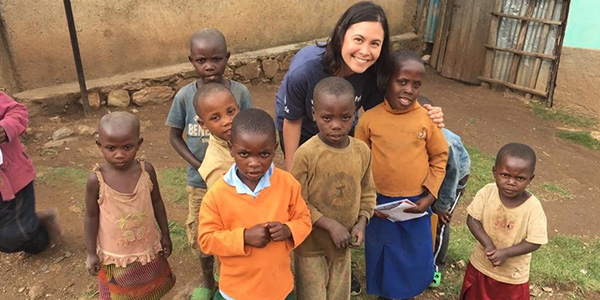
Stephanie during a trip to Rwanda with OneSight
Find out more in the below interview:
What inspired you to study optometry and where did you study?
Sarah: ‘I knew I wanted to do something medical but not a doctor. I started going through allied health professions and quickly ruled out things like dentistry, podiatry and physio. As soon as I thought about optometry, I knew that suited me.
‘As a myopic kid in kindergarten, I was familiar with it, I could study in NSW and I knew I would have the option to work anywhere in Australia. I grew up on the mid north coast of NSW, near Taree, and moved to Sydney to study at UNSW, graduating at the end of 2010.’
Stephanie: ‘I only decided to apply in my last few months of high school. I was the only one in my family who wore glasses and I finished top of my school and in the top 10 in the Northern Territory, so I had a world of opportunities. I went to the newsagent to collect the listings of courses that the major universities offered to create a short list.
‘Optometry ticked the most boxes, including the opportunity to own my own business, and years later I branched out in and around optometry but I never owned my own business! I studied optometry at UNSW and graduated at the end of 2006. I went back to UNSW for my post-graduate in Ocular Therapy (therapeutics.)’
Where did you work after graduating – in what practices and fields?
Sarah: ‘During my final year of optometry, I did a preceptorship with an independent group of practices in Perth then worked as a graduate with them. After a few years, I spent time in the UK before returning to Perth and working in a private ophthalmology practice.
‘During this time, I started doing locum work with the Brien Holden Foundation in the NT. I would do the odd trip once or twice a year. I also worked full time as a solo optometrist in another private practice in Perth for a few years.
‘In 2017, my husband and I packed up our life in Perth, bought a 4WD and camper trailer and set off traveling around Australia. I did some locum work along the way, which was great as I experienced all types of optometry. During our travels, we really enjoyed the NT and I did some extra work for the Foundation in remote Aboriginal Communities.
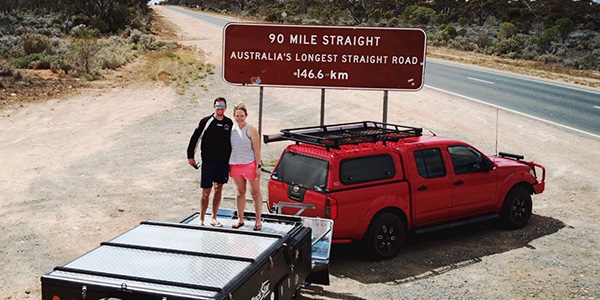 Sarah and husband Paul on their 4WD adventures
Sarah and husband Paul on their 4WD adventures
‘When we returned to Perth at the end of 2018, we decided the city was no longer for us and set about moving back to the NT. We turned around, and drove back to Darwin in February 2019, starting full time work with the Foundation in March 2019.’
Stephanie: ‘I spent about 12 years with Luxottica and had many opportunities. I worked as a dispenser at OPSM George St, Sydney for two years while studying at UNSW. I was invited to work in the store as one of the principal optometrists, and had some amazing mentors. I put my hand up for a regional-remote program to Katherine, Bateau Bay, Kotara, Canberra and Cairns and broadened my horizons.
‘I moved back to Darwin in 2008 and although based at the Darwin store, also worked in regional locations of Gove and Kununurra, WA. Every few months we would fly with portable equipment and a selection of frames and set up for a few days before flying back home.
‘Darwin is where I had freedom to further develop my professional skills, particularly around public speaking. I presented case studies at two Darwin CPD mini-conferences, spoke to airline staff about eye safety in the workplace and organised and helped host three charity dinners.
‘I was appointed a position on the registrations and notifications committee for the Optometry Board of Australia and became a member of the Aboriginal and Torres Strait Islander Eye Health Working Group.
‘During my time with the ATSI Eye Health Working Group, I travelled to Canberra to lobby against the cut in the MBS and the freeze in indexation. I started to do short trips with the Fred Hollows Foundation and later Brien Holden Vision Institute to remote Aboriginal communities and worked alongside an ophthalmologist in Katherine for several days.
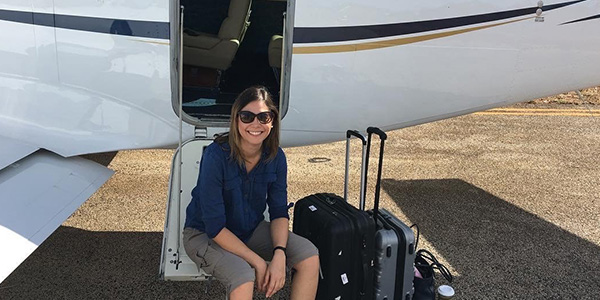
Stephanie on a trip to Robinson River, NT with Brien Holden Vision Institute
I was Area Eyecare Manager for OPSM in WA for four years from 2013, a clinic leader for OneSight and organised multiple school vision screens and continued with OneSight trips to far north Queensland, regional Victoria, China and helped to set up a sustainable clinic in Rwanda.
‘My love for helping the disadvantaged led me to support Optometry WA with vision screens at the yearly Homeless Connect event, and eye tests at Fremantle Homeless shelter.
‘Realising I wanted a change from corporate optometry, an opportunity came up to become Business/Customer Development Manager for Johnson & Johnson Vision WA. This was a scary move as I stepped away from testing but I knew I had the experience and skills to talk with fellow optometrists about the opportunity of soft contact lenses within their business and support them with Acuvue contact lenses.
‘I achieved several awards and was promoted to senior Customer Development Manager and was nominated to be a ‘Credo champion’ for our ANZ team which meant I could help influence our culture at work. To maintain registration, I tested eyes with Lions Outback Vision.
‘I am currently on maternity leave with my first son and am confident in returning to work because of the culture that Johnson & Johnson have for their employees and maintaining a healthy work-life balance. Although my son is currently too young for me to return to visiting remote communities for a few weeks at a time, I am maintaining my registration through locum work interstate.’
When and why did you make the transfer to public health optometry?
Sarah: ‘My first taste of public health optometry was as a student in 2010 when I undertook a placement with BHF (then ICEE) in Tennant Creek. I did my first locum work with BHF in 2015-2016 once I felt I had the confidence to consult in remote locations on my own, joining full time in 2019.
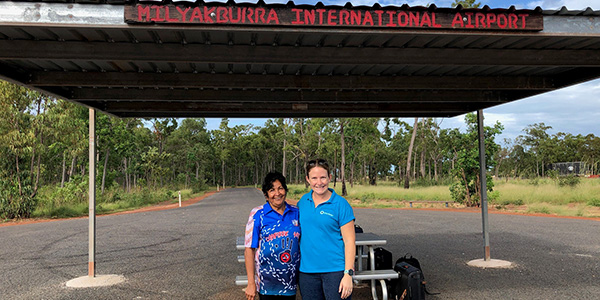
Sarah on Bickerton Island, Arnhem Land, NT
‘Growing up in the country, I’ve always wanted to help those people who are less fortunate and/or don’t have the same opportunities as those in big cities. My time in Perth ended up being longer than initially expected (that’s what you get when you fall in love with a Perth man) so being able to get out to the NT as a locum was a great break from practising in the city. When the time was right in our lives, to move into public health full time, it just felt right.’
Stephanie: ‘Working in Darwin was the launch pad into public health/remote community optometry. There are countless Aboriginal communities without local optometrists so while living in Darwin it made sense to call upon the closest optometrists first.
‘Being a born-n-bred Territorian, and having gained confidence in working in different settings from being on the regional-remote program with Luxottica, I was determined to give it a go. I’ve been doing remote community testing on and off for the last ten years.’
Give different roles a go
Is it good to have different roles? How have they extended your optometric scope or public health reach?
Stephanie: ‘It’s so important to seek different roles and take on opportunities within the industry as they present themselves, even just to give it a go. Sometimes the daily grind can get to you and you never really know what’s out there or what you’d enjoy unless you try it.
‘I started to look for a change a few years back because of the pressures of ‘retail optometry’ but my role as customer development manager has enabled me a broader view of the business and better understanding of how to leverage both sides.
‘During my time at Luxottica, there was lots of public health work with OneSight, but as an Area Eyecare Manager I wore a different hat and coached and mentored optometrists around new technologies and business as well as testing my own patients.
‘I was eligible to apply for an international OneSight trip due to working in remote Aboriginal communities. I was successful and my first trip was to Dongguan, China in 2009. We provided free eye care and eye wear to the less fortunate. The trip was fully funded and we were expected to fundraise what we could.
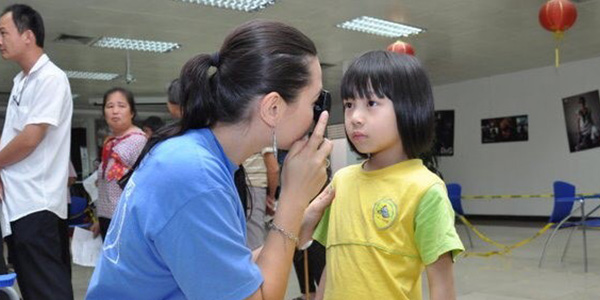
Stephanie in China with OneSight
‘I had the bold ambition to organise and host a corporate charity dinner. I was lucky enough to have the support of two contact lens patients – one who is a musician who was able to guide me with the fundraising dinner, and another who owned a few camera stores and was able to generously donate auction items as well as organise a table of guests.
‘It was very successful and I was asked if I was going to do it again the next year as we already had loyal support. I ran it for another two years until my move to Perth. We raised $20,000 for the charity.
‘I attended the first OneVision clinic in Mt Isa and went on to provide eyecare services in subsequent trips to Mornington Island, Doomadgee and Gidgee Clinic in far north Queensland. In 2016 we did a travelling clinic to schools in East Gippsland and screened and tested over 600 kids within one week. I was also a OneSight Optometry Council member and OneSight Local Clinic Leader and organised school vision screenings in low socio-economic schools around Perth.
‘In 2015, myself and several other Luxottica employees were recognised for their work with OneSight and were treated to a photoshoot for the OPSM/OneSight campaign so my face was used in many OPSM store windows with the statement, ‘My time can make a child’s future brighter.’
‘In 2016 I had my last trip with OneSight to Rwanda. This was different as we were not there to test eyes but to teach select hospital staff how to run a sustainable eye clinic. I had two ‘optometry students’ who I taught basic refraction. It was such an enriching trip and I made lifelong friends. It was also humbling to be able to pass on some knowledge to literally give others the gift of sight.’
Would you recommend public health optometry to upcoming female optometrists and why?
Sarah: ‘I would recommend public health optometry to all optometrists, not just females. I find it so much more interesting and rewarding than routine clinical optometry.’
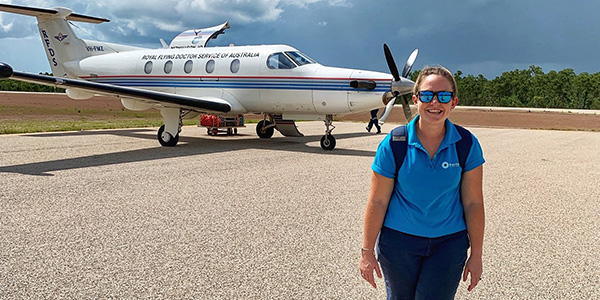
Sarah with a Royal Flying Doctor Service plane at Gapuwiyak, Arnhem Land, NT
Stephanie: ‘Absolutely! The majority of registered optometrists are now female. I have had many opportunities in my career and I do not feel that being female has hindered me in any way. Public health optometry has varied my role, enabled me to stay challenged and refuelled my passion as an optometrist time and time again.
Have you had problems/challenges practising as a female, particularly perhaps in isolated areas?
Sarah: ‘I’ve not found any problems. We are well supported when we travel to remote communities and always travel with an assistant. The Aboriginal and Torres Strait Islander people are very welcoming and appreciative of our services and I’ve never felt unsafe with a patient or in a community.’
Stephanie: ‘I haven’t noticed significant challenges. One occasion when I just graduated the patient thought I was the receptionist walking him to the male optometrist but perhaps I just looked young!
‘For community work, you have to do Aboriginal cultural awareness/sensitivity training so you can be respectful toward the community and I found this helpful, so I was also received well. But being a lone female in an unfamiliar remote location people learn you regularly visit by yourself so you cannot become too complacent.’
Do you think in the future there will be more roles for female optometrists in public health?
Sarah: ‘Yes definitely, there are more and more public health roles opening up in Aboriginal and Torres Strait Islander care, refugee care, nursing homes etc. I think this is a great thing, optometry is expanding and becoming more flexible in our delivery of care and how we help people. I think the more the general public and other organisations understand that we are not just here to sell glasses, the better our profession is being understood.’
Stephanie: ‘I believe that naturally there will be more roles for female optometrists in public health as more and more female optometrists graduate from optometry. The new optometry course starting in WA will generate more optometrists but will the opportunities present in the public health space? Will the roles be flexible towards a supportive family lifestyle? We need to help shape our own future.’
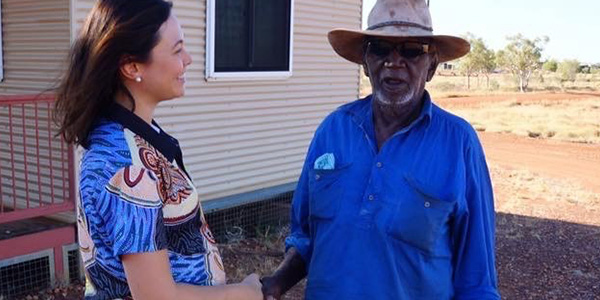
Stephanie farewelling a patient on her last Halls Creek round with Lions Outback Clinic in May 2019. She was in her third trimester of pregnancy, and knew that it would be a few more years before she would be able to do another week-long community trip
Do you think optometry is a field that is moving more into the public health arena and with expanding scope in the future will do so even more (ie diabetes)?
Sarah: ‘Yes definitely, a major part of our role in public health is education. For example, we are currently undertaking a project to deliver retinal cameras to over 160 remote locations in Australia, and to train local health staff to take photos and triage for diabetic retinopathy. This not only helps with optometry and ophthalmology care but also patient education on their own general and systemic diabetic health.
‘Other areas of public health optometry we are involved in include comprehensive eye care for newly arrived refugees and asylum seekers. This is another vulnerable group of people who could miss out if they were forced into mainstream optometry.’
Stephanie: ‘Currently the real gap in optometry is in the regional locations with oversaturation of some urban areas. I feel that we are slowly moving more into the public health arena, particularly with the great work of VOS optometrists and organisations. However, I also feel that we need to be more adaptive to the changing public health space to ensure that we maintain our position as respected optometrists in the health care industry.
‘We have been heavily dependent on retail sales in optometry and with serious competition and online sales as well as the threat of online or self-administered testing, we have to change our tactics to survive. The Good Vision for Life campaign is helping us to become first ports of call to the general public when often they might present to their GP.
‘We also need to embrace emerging and new technology within glasses and contact lenses, and foster tighter relationships with doctors and allied health in co-management of the aging population, particularly in the public health space. I believe that we need to come together often to collaborate on ideas to help shape the future of optometry, ensure equal opportunity for all patients, and call upon our Government as needed.’
Stephanie: ‘To the early career optometrists: network as much as you can, ask questions, answer questions, and don’t be afraid of change. There is always room for growth, even if it’s in your personal life. Being on maternity leave has taught me to reset and make more time for myself. Seek a role within optometry or an employer that allows you to be your best you.’
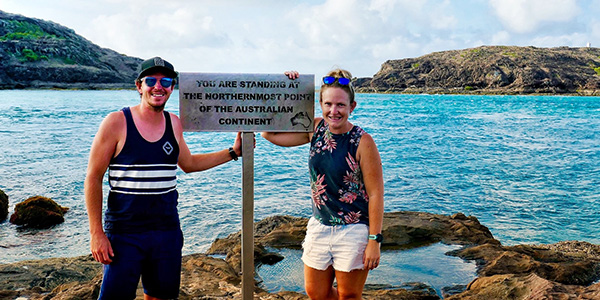 Sarah and husband Paul at Cape York
Sarah and husband Paul at Cape York
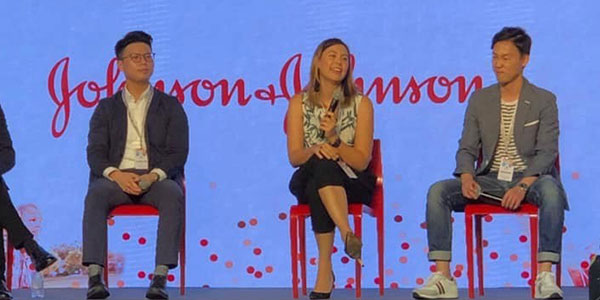
Stephanie on stage at a Johnson & Johnson event
Tagged as: Indigenous eye health, Remote & rural optometry